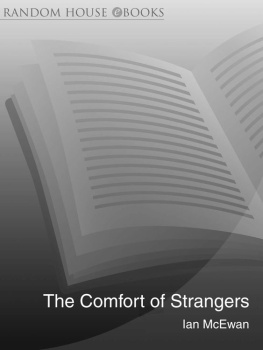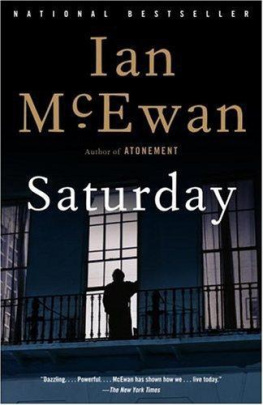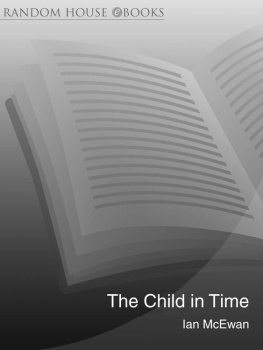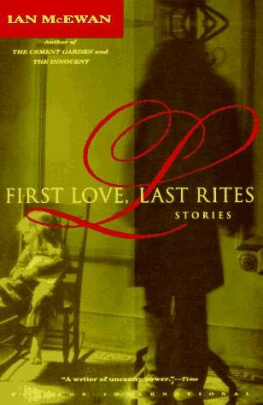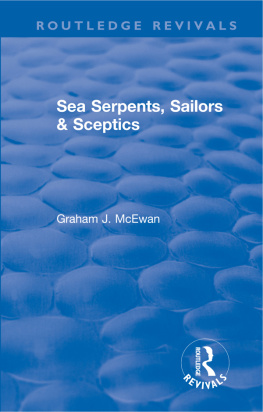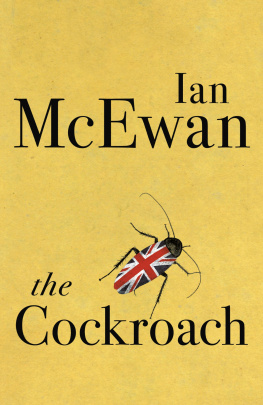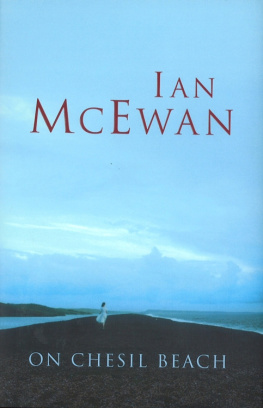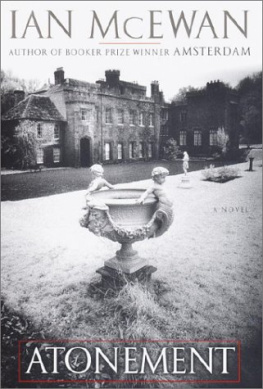Ian McEwan - The Comfort of Strangers
Here you can read online Ian McEwan - The Comfort of Strangers full text of the book (entire story) in english for free. Download pdf and epub, get meaning, cover and reviews about this ebook. year: 1981, publisher: Jonathan Cape, genre: Detective and thriller. Description of the work, (preface) as well as reviews are available. Best literature library LitArk.com created for fans of good reading and offers a wide selection of genres:
Romance novel
Science fiction
Adventure
Detective
Science
History
Home and family
Prose
Art
Politics
Computer
Non-fiction
Religion
Business
Children
Humor
Choose a favorite category and find really read worthwhile books. Enjoy immersion in the world of imagination, feel the emotions of the characters or learn something new for yourself, make an fascinating discovery.
- Book:The Comfort of Strangers
- Author:
- Publisher:Jonathan Cape
- Genre:
- Year:1981
- Rating:4 / 5
- Favourites:Add to favourites
- Your mark:
- 80
- 1
- 2
- 3
- 4
- 5
The Comfort of Strangers: summary, description and annotation
We offer to read an annotation, description, summary or preface (depends on what the author of the book "The Comfort of Strangers" wrote himself). If you haven't found the necessary information about the book — write in the comments, we will try to find it.
The Comfort of Strangers — read online for free the complete book (whole text) full work
Below is the text of the book, divided by pages. System saving the place of the last page read, allows you to conveniently read the book "The Comfort of Strangers" online for free, without having to search again every time where you left off. Put a bookmark, and you can go to the page where you finished reading at any time.
Font size:
Interval:
Bookmark:
IAN McEWAN
of Strangers

This eBook is copyright material and must not be copied, reproduced, transferred, distributed, leased, licensed or publicly performed or used in any way except as specifically permitted in writing by the publishers, as allowed under the terms and conditions under which it was purchased or as strictly permitted by applicable copyright law. Any unauthorised distribution or use of this text may be a direct infringement of the authors and publishers rights and those responsible may be liable in law accordingly.
Version 1.0
Epub ISBN 9781409089865
www.randomhouse.co.uk
Published by Vintage 2006
21 23 24 22
Copyright Ian McEwan 1981
Ian McEwan has asserted his right under the Copyright, Designs and Patents Act, 1988 to be identified as the author of this work
This book is sold subject to the condition that it shall not by way of trade or otherwise, be lent, resold, hired out, or otherwise circulated without the publishers prior consent in any form of binding or cover other than that in which it is published and without a similar condition including this condition being imposed on the subsequent purchaser
First published in Great Britain in 1981 by
Jonathan Cape
First published by Vintage in 1997
Vintage
Random House, 20 Vauxhall Bridge Road,
London SW1V 2SA
www.vintage-books.co.uk
Addresses for companies within The Random House Group Limited can be found at: www.randomhouse.co.uk/offices.htm
The Random House Group Limited Reg. No. 954009
A CIP catalogue record for this book is available from the British Library
ISBN 9780099754916
The Random House Group Limited supports The Forest Stewardship Council (FSC), the leading international forest certification organisation. All our titles that are printed on Greenpeace approved FSC certified paper carry the FSC logo. Our paper procurement policy can be found at:
www.rbooks.co.uk/environment
Printed and bound in Great Britain by Cox & Wyman Ltd, Reading, Berkshire
Ian McEwan has written two collections of stories, First Love, Last Rites and In Between the Sheets, and ten novels, The Cement Garden, The Comfort of Strangers, The Child in Time, The Innocent, Black Dogs, The Daydreamer, Enduring Love, Amsterdam, Atonement, Saturday and On Chesil Beach. He won the Booker Prize for Amsterdam in 1998
how we dwelt in two worlds the daughters and the mothers in the kingdom of the sons
Adrienne Rich
Travelling is a brutality. It forces you to trust strangers and to lose sight of all that familiar comfort of home and friends. You are constantly off balance. Nothing is yours except the essential things air, sleep, dreams, the sea, the sky all things tending towards the eternal or what we imagine of it.
Cesare Pavese
E ACH AFTERNOON , when the whole city beyond the dark green shutters of their hotel windows began to stir, Colin and Mary were woken by the methodical chipping of steel tools against the iron barges which moored by the hotel caf pontoon. In the morning these rusting, pitted hulks, with no visible cargo or means of propulsion, would be gone; towards the end of each day they reappeared, and their crews set to inexplicably with their mallets and chisels. It was at this time, in the clouded, late afternoon heat, that customers began to gather on the pontoon to eat ice cream at the tin tables, and their voices too filled the darkened hotel room, rising and falling in waves of laughter and dissent, flooding the brief silences between each piercing blow of the hammers.
They woke, so it seemed to them, simultaneously, and lay still on their separate beds. For reasons they could no longer define clearly, Colin and Mary were not on speaking terms. Two flies gyrated lazily round the ceiling light, along the corridor a key turned in a lock and footsteps advanced and receded. At last, Colin rose, pushed the shutters ajar and went to the bathroom to shower. Still absorbed in the aftermath of her dreams, Mary turned on her side as he passed and stared at the wall. The steady trickle of water next door made a soothing sound, and she closed her eyes once more.
Each evening, in the ritual hour they spent on their balcony before setting out to find a restaurant, they had been listening patiently to the others dreams in exchange for the luxury of recounting their own. Colins dreams were those that psycho-analysts recommend, of flying, he said, of crumbling teeth, of appearing naked before a seated stranger. For Mary the hard mattress, the unaccustomed heat, the barely explored city were combining to set loose in her sleep a turmoil of noisy, argumentative dreams which, she complained, numbed her waking hours; and the fine old churches, the altar-pieces, the stone bridges over canals, fell dully on her retina, as on a distant screen. She dreamed most frequently of her children, that they were in danger, and that she was too incompetent or muddled to help them. Her own childhood became confused with theirs. Her son and daughter were her contemporaries, frightening her with their insistent questions. Why did you go away without us? When are you coming back? Will you meet us off the train? No, no, she tried to tell them, you are meant to be meeting me. She told Colin that she dreamed her children had climbed into bed with her, one on either side, and there they lay, bickering all night over her sleeping body. Yes I did. No you didnt. I told you. No you didnt until she woke exhausted, her hands pressed tight against her ears. Or, she said, her ex-husband steered her into a corner and began to explain patiently, as he once had, how to operate his expensive Japanese camera, testing her on its intricacies at every stage. After many hours she started to sigh and moan, begging him to stop, but nothing could interrupt the relentless drone of explanation.
The bathroom window gave on to a courtyard and at this hour it too came alive with sounds from adjacent rooms and the hotel kitchens. The moment Colin turned his shower off, the man across the way under his shower began, as on the previous evenings, to sing his duet from The Magic Flute. His voice rising above the torrential thunder of water and the smack and squelch of well-soaped skin, the man sang with the total abandon of one who believes himself to be without an audience, cracking and yodelling the higher notes, tra-laing the forgotten words, bellowing out the orchestral parts. Mann und Weib, und Weib und Mann, Together make a godly span. When the shower was turned off, the singing subsided to a whistle.
Colin stood in front of the mirror, listening, and for no particular reason began to shave for the second time that day. Since their arrival, they had established a well-ordered ritual of sleep, preceded on only one occasion by sex, and now the calm, self-obsessed interlude during which they carefully groomed themselves before their dinner-time stroll through the city. In this time of preparation, they moved slowly and rarely spoke. They used expensive, duty-free colognes and powders on their bodies, they chose their clothes meticulously and without consulting the other, as though somewhere among the thousands they were soon to join, there waited someone who cared deeply how they appeared. While Mary did her yoga on the bedroom floor, Colin would roll a marihuana joint which they would smoke on their balcony and which would enhance that delightful moment when they stepped out of the hotel lobby into the creamy evening air.
While they were out, and not only in the mornings, a maid came and tidied the beds, or removed the sheets, if she thought that was necessary. Unused to hotel life, they were inhibited by this intimacy with a stranger they rarely saw. The maid took away used paper tissues, she lined up their shoes in the cupboard in a tidy row, she folded their dirty clothes into a neat pile on a chair and arranged loose change into little stacks along the bedside table. Rapidly, however, they came to depend on her and grew lazy with their possessions. They became incapable of looking after one another, incapable, in this heat, of plumping their own pillows, or of bending down to retrieve a dropped towel. At the same time they had become less tolerant of disorder. One late morning, they returned to their room to find it as they had left it, simply uninhabitable, and they had no choice but to go out again and wait until it had been dealt with.
Next pageFont size:
Interval:
Bookmark:
Similar books «The Comfort of Strangers»
Look at similar books to The Comfort of Strangers. We have selected literature similar in name and meaning in the hope of providing readers with more options to find new, interesting, not yet read works.
Discussion, reviews of the book The Comfort of Strangers and just readers' own opinions. Leave your comments, write what you think about the work, its meaning or the main characters. Specify what exactly you liked and what you didn't like, and why you think so.

